 Petzlover
Petzlover British Shorthair is originated from United Kingdom but Chartreux is originated from France. Both British Shorthair and Chartreux are of same weight. British Shorthair may live 5 years more than Chartreux. Both British Shorthair and Chartreux has same litter size. British Shorthair requires Low Maintenance. But Chartreux requires Moderate Maintenance
British Shorthair is originated from United Kingdom but Chartreux is originated from France. Both British Shorthair and Chartreux are of same weight. British Shorthair may live 5 years more than Chartreux. Both British Shorthair and Chartreux has same litter size. British Shorthair requires Low Maintenance. But Chartreux requires Moderate Maintenance
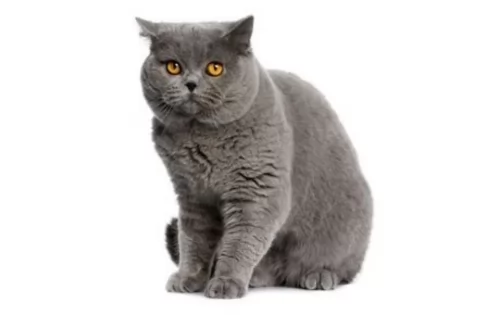 A cat breeder, Harrison Wier took a street cat of Britain and with an intensive breeding program, transformed it to the British Shorthair.
A cat breeder, Harrison Wier took a street cat of Britain and with an intensive breeding program, transformed it to the British Shorthair.
The British loved this beautiful pedigree cat. During the Second World War, the British Shorthair all but disappeared but re-emerged as a popular cat that is today accepted in cat registries around the world.
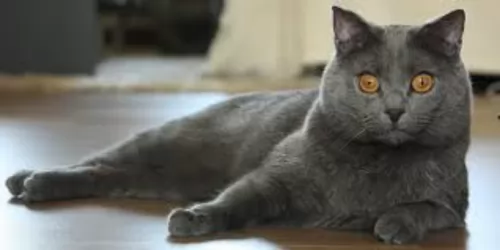 Hailing from France, the Chartreux cat is a rare cat breed but is still recognized by a number of cat registries around the world.
Hailing from France, the Chartreux cat is a rare cat breed but is still recognized by a number of cat registries around the world.
It’s not a new breed of cat, and in fact, the Chartreux is mentioned for the first time in 1558 in a poem and later on in paintings. There are quite a few legends as to the origins of the Chartreux and while some believe that the cats were brought to France by monks others believe that the Chartreux's ancestors were feral mountain cats from Syria.
European breeders kept the breed from extinction, especially after the 2nd world war, and the first Chartreux were brought to the United States in 1971. In 1987 the Cat Fancier’s Asociation advanced the Chartreux breed to championship status.
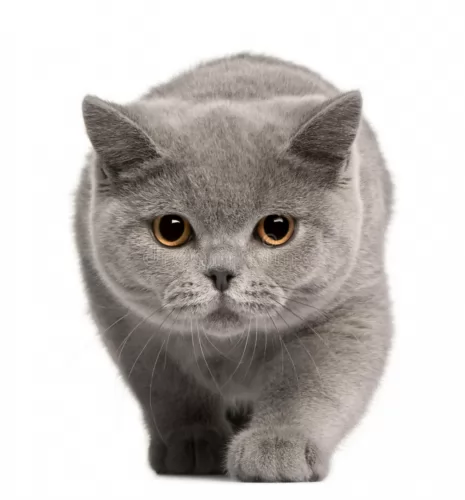 The British Shorthair is a medium to large-sized cat and he can be anything from 5 to 9kg. He has a short to medium-length dense coat that can either be a solid color, bi-color tortoiseshell or patterned.
The British Shorthair is a medium to large-sized cat and he can be anything from 5 to 9kg. He has a short to medium-length dense coat that can either be a solid color, bi-color tortoiseshell or patterned.
The coat becomes thicker and longer in the winter. This is a robust, strong cat, being heavily muscled with heavy bones. The cat also has a broad chest with thick, strong legs. The ears are fairly small and the round eyes give him a totally amicable expression on his face.
The British Shorthair is an amicable cat and makes a superb companion as it's an easy-going cat that adores his human family, being loyal towards them.
The British Shorthair is an active cat and it is able to get by on his own for a few hours without human company. If you do work particularly long hours and you go out a lot, it will be kind to perhaps get another cat for him as a friend.
He is quiet and undemanding and because he is big and heavy he doesn’t like being carried around.
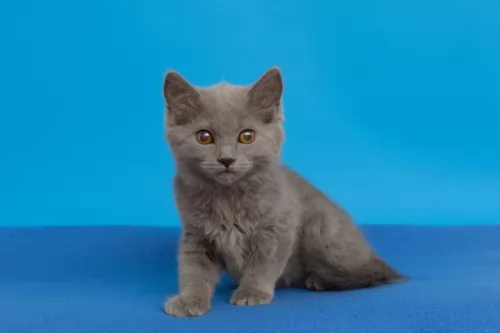 The Chartreux is a large, strong, stocky, muscular cat that can weigh anything between 4 to 7kg while some can weigh as much as 9kg.
The Chartreux is a large, strong, stocky, muscular cat that can weigh anything between 4 to 7kg while some can weigh as much as 9kg.
He has short legs when compared to the large body. He is known for his blue-like, silver-gray coat. In fact, the color can be any shade in the region of blue-grey. The coat is short, dense and double-coated and he has gold or copper-colored eyes.
People who have owned these cats say that they can take 3 to 4 years to reach maturity. Some people get mixed up and think this cat is very similar to the British Blue but they are two different breeds altogether.
The Chartreux is a real lap-cat just loving being able to settle down into his human owner's lap. It’s a cat with a 'smiling’ face because of the structure of his muzzle.
He is a very affectionate cat and will follow his people much like a dog. He is very intelligent and quiet and adapts well to a new situation. It's a cat that loves to climb so you will need to invest in a climbing tree for him as well as a scratching pole.
He is a good cat for first-time cat owners as well as being a good friend in homes with well brought up children. He is able to be friendly with other pets in the house.
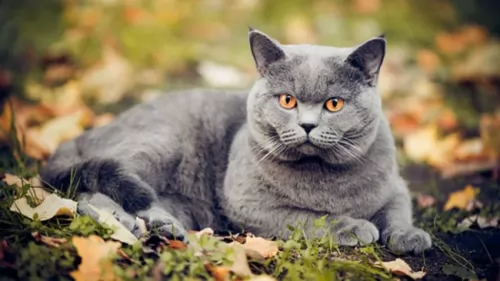 The British Shorthair is such a companionable cat, being intelligent and affectionate, even though he isn’t a lapcat as such.
The British Shorthair is such a companionable cat, being intelligent and affectionate, even though he isn’t a lapcat as such.
That doesn’t mean he doesn’t love being around his human companions. He does and is loyal to them.
They’re laid back cats and are capable of getting on well with children in the home as well as with other pets. He just loves lazing around in the sun and can spend a few hours on his own without feeling anxious or lonely.
These cats are really great companions and they make themselves at home in different lifestyles, whether you live in the countryside or in town and whether you are single, a couple or a family with children and other pets.
Easy to care for, the British Shorthair cat is guaranteed to make you an excellent companion.
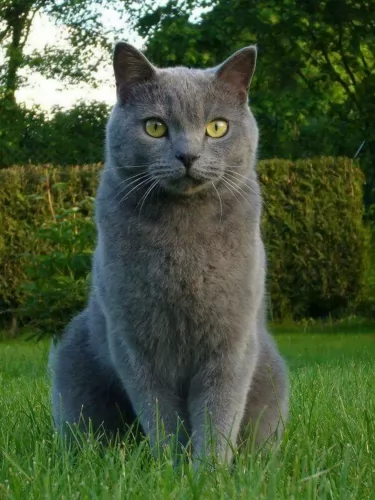 Although this is a large, strong cat, he is actually a gentle feline in nature and he doesn’t like being part of any bickering among his human family, preferring to run away. He also doesn’t like being spoken harshly to when he has done something wrong.
Although this is a large, strong cat, he is actually a gentle feline in nature and he doesn’t like being part of any bickering among his human family, preferring to run away. He also doesn’t like being spoken harshly to when he has done something wrong.
This cat isn’t an extrovert by any means but he isn’t particularly shy either and enjoys spending time with his human family.
He isn’t a demanding cat but is easy-going, just wanting to get on in life and he promises to make you a steady, loyal companion.
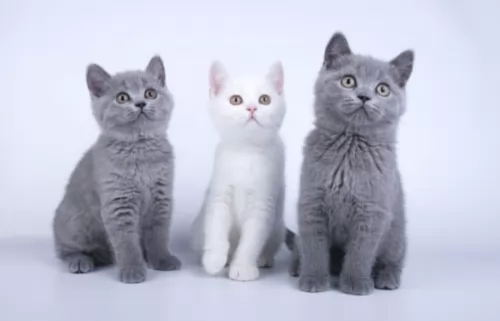 These beautiful cats are a robust, healthy type of cat breed and if you care well for him, you aren’t going to be taking him along to the vet too often. He can also live to be up to 20 years of age.
These beautiful cats are a robust, healthy type of cat breed and if you care well for him, you aren’t going to be taking him along to the vet too often. He can also live to be up to 20 years of age.
This cat has been bred with Persians in the past, so this should alert you to some of the diseases that this particular cat breed is susceptible to. It makes the cat a little bit vulnerable to polycystic kidney, an inherited condition in cats that causes cysts to form in the kidneys. They are small at first but they can grow bigger and actually result in kidney failure.
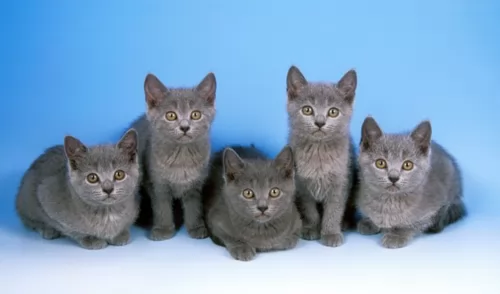 These cats are particularly prone to dental problems. The reason for this is that their incisors are closely set together and small.
These cats are particularly prone to dental problems. The reason for this is that their incisors are closely set together and small.
Because of the heaviness of this cat, the Chartreux is also prone to a disease known as patellar luxation or kneecap displacement. This problem can eventually lead to lameness. One way to avoid this particular problem is to rather get your kittens from reputable breeders.
These cats are much inclined towards weightiness so you have to be watching his diet carefully, more so because the cat is prone to patellar luxation.
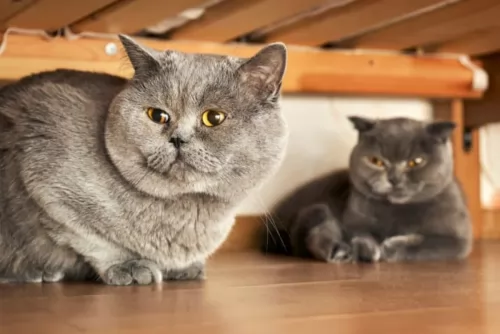 The British Shorthair is a fairly large, robust cat but that certainly doesn’t mean he must be fat. Being overweight can bring about a range of health issues and you want to follow an appropriate diet for him ad see that he gets enough exercise.
The British Shorthair is a fairly large, robust cat but that certainly doesn’t mean he must be fat. Being overweight can bring about a range of health issues and you want to follow an appropriate diet for him ad see that he gets enough exercise.
When it comes to feeding your British Shorthair, always look out for the very best, most nutritious food there is as he is a big cat.
You want to ensure your pet gets enough protein as cats are carnivores - they’re meat eaters and they require chicken, beef and fish. You can give your cat some cooked egg as they are an excellent source of protein.
Be very careful not to be tempted to give your cat chocolates, grapes, nuts, onions or garlic as foods like this are toxic for your cat and can cause him pain and discomfort.
Remember to ensure that there is always a constant supply of fresh, cool water for your cat. If you’re wondering what to feed your cat or you have any other concerns, don’t hesitate to speak to your vet.
Brush your British Shorthair when he starts to shed his winter coat and trim the nails.
Do things for your cat that you would do for your own human child. This is your beloved fur-child and you want him to be happy and healthy.
Check inside his mouth to make sure there aren’t any loose or blackened teeth that could be causing him terrible pain. Also, check inside his ears for signs of redness.
Your British Shorthair is an elegant, clean type of cat so you want to keep his litterbox nice and clean for him.
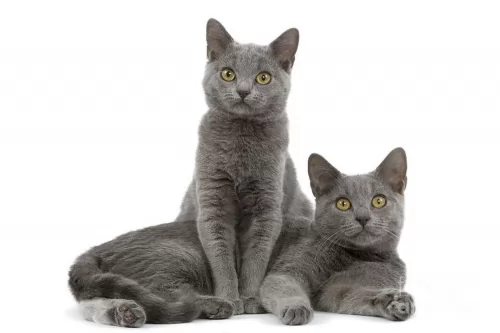 Your Chartreux cat’s dense, double coat will require brushing once or twice a week, especially in the cat’s seasonal shedding period.
Your Chartreux cat’s dense, double coat will require brushing once or twice a week, especially in the cat’s seasonal shedding period.
This cat doesn't take well to changes in his diet, particularly when he finds a type of food that he likes, then he wants to stick to that. You want to feed your cat a top-quality food to encourage good health but you want to avoid overfeeding as obesity in cats comes with lots of problems. A cat is a carnivore and you therefore need to feed your cat a diet rich in protein. Speak to your vet or another cat expert who can advise you on feeding your cat if you are in any kind of doubt. Make sure your kitty kat has a never-ending supply of fresh, cool water.
Always make a point of checking inside your cat's ears as well as inside his mouth for bad teeth. Bad teeth can cause terrible pain and your pet has no way of communicating this to you.
Have your cat neutered or spayed if you don't want your cat to have kittens.